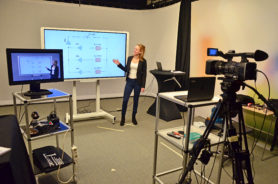Good practices
Should you sound enthusiastic when recording an instructional video?
Much research has been done on how best to design instruction videos. Esmee Mocking studied enthusiasm during her Masters in Educational Sciences at Utrecht University: Does an enthusiastic speaker in an instructional film increase learning outcomes and attention? Among other things, she used eye-tracking.
The research
 To research this, Esmee recorded two short physics films about detecting and solving errors in electrical circuits: one film was voiced very enthusiastically (various gestures, a lot of intonation, etc.) and the other film was not voiced enthusiastically (hands in pockets, monotonous voice, etc.). The films were recorded by the same person and with exactly the same text.
To research this, Esmee recorded two short physics films about detecting and solving errors in electrical circuits: one film was voiced very enthusiastically (various gestures, a lot of intonation, etc.) and the other film was not voiced enthusiastically (hands in pockets, monotonous voice, etc.). The films were recorded by the same person and with exactly the same text.
Next 23 students were shown one film and 23 students the other. The students were from colleges and universities from all over the Netherlands, and had had no physics in high school (to check if they did not have too much knowledge of physics, they also did a foreknowledge test). While watching the videos, eye movements were recorded so that you could see how often someone looked at the relevant information. After the films, the students had to solve problems to test how much they had remembered, and they had to indicate what they thought of the explanation and how much effort it took to keep their attention on the video.
The results
The speaker’s enthusiasm had no effect on learning outcomes and on the degree to which someone looked at the relevant information from the video. Esmee did find a significant difference in the extent to which the students’ thoughts, in their experience, strayed while watching the film. Although the attention of the students did not relax (as was evident from the eye-tracking), they did feel that their attention drifted when watching the video with the non-enthusiastic speaker (they had to answer a question about this after watching the video).
Conclusion and follow-up research
So it requires less effort to watch an enthusiastic speaker than a non-enthusiastic speaker, but this has no effect on the learning outcomes and watching relevant information from a video. Esmee did not use a third film with a neutral speaker in her research; perhaps you might see a higher learning outcome in that condition. Dr. Margot van Wermeskerken (Utrecht University), Esmee’s supervisor, may do follow-up research into this.
Esmee really enjoyed carrying out this research: “Recording the videos and carrying out the experiments, doing practical work, it was great! I really enjoyed seeing how people responded to the videos.”
Author: Miranda Overbeek (Freudenthal Instituut)

